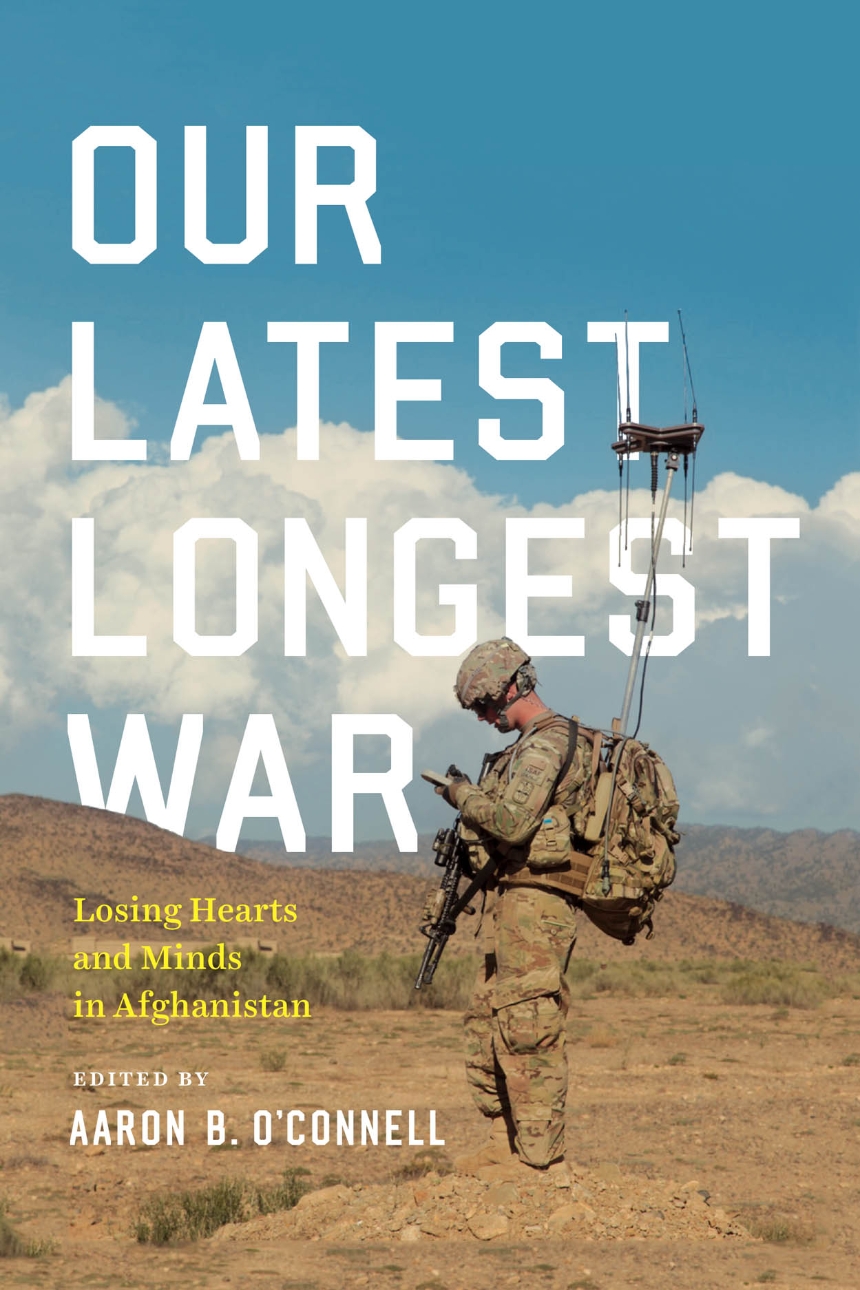Our Latest Longest War
Losing Hearts and Minds in Afghanistan
9780226598567
9780226265650
9780226265797
Our Latest Longest War
Losing Hearts and Minds in Afghanistan
The first rule of warfare is to know one’s enemy. The second is to know thyself. More than fifteen years and three quarters of a trillion dollars after the US invasion of Afghanistan, it’s clear that the United States followed neither rule well.
America’s goals in Afghanistan were lofty to begin with: dismantle al Qaeda, remove the Taliban from power, remake the country into a democracy. But not only did the mission come completely unmoored from reality, the United States wasted billions of dollars, and thousands of lives were lost. Our Latest Longest War is a chronicle of how, why, and in what ways the war in Afghanistan failed. Edited by historian and Marine lieutenant colonel Aaron B. O’Connell, the essays collected here represent nine different perspectives on the war—all from veterans of the conflict, both American and Afghan. Together, they paint a picture of a war in which problems of culture and an unbridgeable rural-urban divide derailed nearly every field of endeavor. The authors also draw troubling parallels to the Vietnam War, arguing that deep-running ideological currents in American life explain why the US government has repeatedly used armed nation-building to try to transform failing states into modern, liberal democracies. In Afghanistan, as in Vietnam, this created a dramatic mismatch of means and ends that neither money, technology, nor the force of arms could overcome.
The war in Afghanistan has been the longest in US history, and in many ways, the most confounding. Few who fought in it think it has been worthwhile. These are difficult topics for any American or Afghan to consider, especially those who lost friends or family in it. This sobering history—written by the very people who have been fighting the war—is impossible to ignore.
America’s goals in Afghanistan were lofty to begin with: dismantle al Qaeda, remove the Taliban from power, remake the country into a democracy. But not only did the mission come completely unmoored from reality, the United States wasted billions of dollars, and thousands of lives were lost. Our Latest Longest War is a chronicle of how, why, and in what ways the war in Afghanistan failed. Edited by historian and Marine lieutenant colonel Aaron B. O’Connell, the essays collected here represent nine different perspectives on the war—all from veterans of the conflict, both American and Afghan. Together, they paint a picture of a war in which problems of culture and an unbridgeable rural-urban divide derailed nearly every field of endeavor. The authors also draw troubling parallels to the Vietnam War, arguing that deep-running ideological currents in American life explain why the US government has repeatedly used armed nation-building to try to transform failing states into modern, liberal democracies. In Afghanistan, as in Vietnam, this created a dramatic mismatch of means and ends that neither money, technology, nor the force of arms could overcome.
The war in Afghanistan has been the longest in US history, and in many ways, the most confounding. Few who fought in it think it has been worthwhile. These are difficult topics for any American or Afghan to consider, especially those who lost friends or family in it. This sobering history—written by the very people who have been fighting the war—is impossible to ignore.
An audiobook version is available.
400 pages | 25 halftones | 6 x 9 | © 2017
History: American History, Military History
Political Science: Diplomacy, Foreign Policy, and International Relations
Reviews
Table of Contents
Introduction Moving Mountains: Cultural Friction in the Afghanistan War
Lieutenant Colonel Aaron B. O’Connell, USMC
Chapter One Washington Goes to War
Ambassador Ronald E. Neumann
Chapter Two US Strategy in Afghanistan: A Tragedy in Five Acts
Lieutenant Colonel Colin Jackson, USA
Chapter Three In Our Own Image: Training the Afghan National Security Forces
Dr. Martin Loicano and Captain Craig C. Felker, USN
Chapter Four The Impact of Culture on Policing in Afghanistan
Captain Pashtoon Atif, ANP
Chapter Five Building and Undermining Legitimacy: Reconstruction and Development in Afghanistan
Lieutenant Commander Jamie Lynn De Coster, USN
Chapter Six Rule of Law and Governance in Afghanistan, 2001–2014
Colonel Abigail T. Linnington, USA, and Lieutenant Colonel Rebecca D. Patterson, USA
Chapter Seven Liberalism Does Its Thing
Captain Aaron MacLean, USMC
Chapter Eight Organizing like the Enemy: Special Operations Forces, Afghan Culture, and Village Stability Operations
Lieutenant Commander Daniel R. Green, USN
Chapter Nine Leaving Afghanistan
Lieutenant Colonel Benjamin F. Jones, USAF
Conclusion Our Latest Longest War
Lieutenant Colonel Aaron B. O’Connell, USMC
Acknowledgments
List of Abbreviations
Notes
About the Contributors
Lieutenant Colonel Aaron B. O’Connell, USMC
Chapter One Washington Goes to War
Ambassador Ronald E. Neumann
Chapter Two US Strategy in Afghanistan: A Tragedy in Five Acts
Lieutenant Colonel Colin Jackson, USA
Chapter Three In Our Own Image: Training the Afghan National Security Forces
Dr. Martin Loicano and Captain Craig C. Felker, USN
Chapter Four The Impact of Culture on Policing in Afghanistan
Captain Pashtoon Atif, ANP
Chapter Five Building and Undermining Legitimacy: Reconstruction and Development in Afghanistan
Lieutenant Commander Jamie Lynn De Coster, USN
Chapter Six Rule of Law and Governance in Afghanistan, 2001–2014
Colonel Abigail T. Linnington, USA, and Lieutenant Colonel Rebecca D. Patterson, USA
Chapter Seven Liberalism Does Its Thing
Captain Aaron MacLean, USMC
Chapter Eight Organizing like the Enemy: Special Operations Forces, Afghan Culture, and Village Stability Operations
Lieutenant Commander Daniel R. Green, USN
Chapter Nine Leaving Afghanistan
Lieutenant Colonel Benjamin F. Jones, USAF
Conclusion Our Latest Longest War
Lieutenant Colonel Aaron B. O’Connell, USMC
Acknowledgments
List of Abbreviations
Notes
About the Contributors
